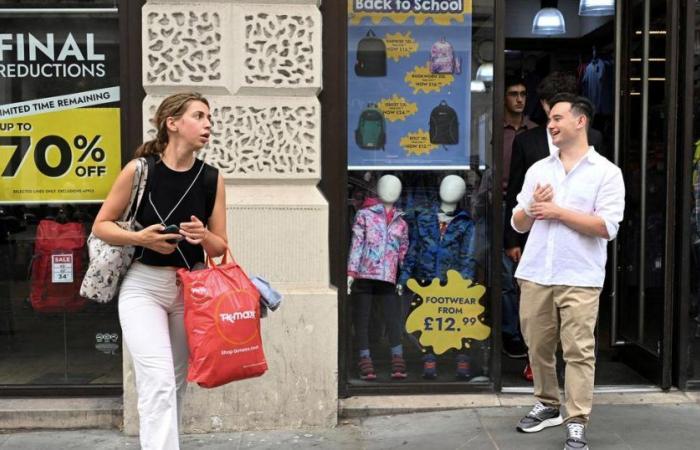British inflation reached its lowest level in three years in September, at 1.7%, a figure below expectations, which should push the Bank of England (BoE) to lower its interest rates by the end of the year. This slowdown constitutes good news for the government of Prime Minister Keir Starmer, looking for positive announcements two weeks before the presentation of its first budget, which will be difficult due to the state of the country’s public finances. The British suffered the full brunt of very high inflation for several months, peaking at 11.1% in October 2022. The rate has continued to fall since then, until reaching 2% last May, the target of the Bank of England, then rising slightly to 2.2% last month.
The decline in inflation in September can be explained, according to Grant Fitzner, of the Office for National Statistics (ONS), by “the fall in prices of plane tickets and oil”partly thwarted “through increases in the prices of food and non-alcoholic drinks”. “It is absolutely stunning to see such a dramatic decline”comments Naeem Aslam, analyst at Zaye Capital. “The Bank of England must now seize this opportunity and return interest rates to their normal levels”he adds.
Also read
United Kingdom: inflation at 1.7% in September, its lowest level in three years
“Good economic news”
The BoE reduced its rates at the beginning of August, for the first time since 2020, to 5% compared to 5.25% previously, but then affirmed its intention to cautiously continue monetary easing. Its rate thus remained unchanged in September. At the beginning of October, its governor Andrew Bailey, however, mentioned a rate cut “a little more aggressive” at the next meetings in November and December if the slowdown in inflation is confirmed. A new rate cut next month therefore seems to be the hypothesis favored by almost all analysts on Wednesday morning.
“The last time inflation was below 2% was in April 2021, when the country had just emerged from the third lockdown and strict social distancing measures were in place”recalls Susannah Streeter, analyst at Hargreaves Lansdown. “Some still expect it to resume in the coming months”she adds, but “it seems that the fight against insidious price increases has been won and, combined with the slowdown in wage growth”a rate cut in November seems increasingly likely. For Lindsay James of Quilter Investors, the slowdown in inflation also has merit “satisfy the government as the highly anticipated budget approaches, where we are constantly told that difficult decisions will be announced”. “Any bit of good economic news will probably be exploited”she anticipates.
The British Finance Minister, Rachel Reeves, is due to present on October 30 the first budget of the new Labor government, which came to power in July, which should combine tax increases and tightening spending. Labor must notably face a huge public debt, not seen since the 1960s, equivalent to its annual GDP (gross domestic product). They also claim to have inherited a “black hole” of 22 billion pounds (26 billion euros) from previous Conservative governments.






